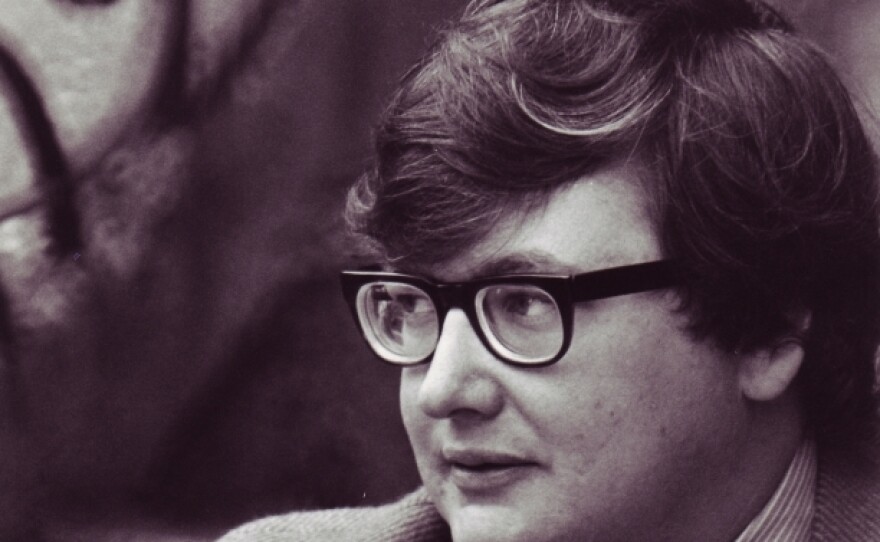"I was born inside the movie of my life."
Those words open the new memoir Life Itself from the film critic Roger Ebert, who has made movies his life for more than four decades now. He and his sparring partner, the late Gene Siskel, had the most famous thumbs on television. Now, at age 69, Ebert depends on the same thumbs-up that he and Siskel made famous to help him communicate in daily life. Five years ago, after multiple cancer surgeries, he lost the ability to speak.
On the glass door of his office in his Chicago townhouse, gold letters spell out "The Ebert Company Limited: Fine Film Criticism Since 1967."
On the wall hangs his Pulitzer Prize, from 1975. He was the first film critic to win one.
Ebert points with delight to a manual L.C. Smith and Corona typewriter on a shelf. He scribbles a message in a small spiral notebook:
"1966 — bought it for $25! Used until 1980s, when I got a Tandy."
Ebert still churns out half a dozen reviews every week, and typing has become his means of speech.
"This is 'Alex,'" he explains, "a voice that came built into my computer."
Alex is part of a text-to-speech program; Ebert types, Alex speaks the words. The words flow at a remarkable rate, given that he laboriously hunts and pecks with just two fingers across the keyboard.
'A Strong Sense Of Morality About Film'
Ebert's first movie memory: at 3, watching the Marx Brothers' A Day at the Races in Urbana Ill.
"The Marx Brothers seemed very strange to me and a little disturbing," Ebert recalls. "Years later, I met Groucho" — the name comes out GROU-ko in Alex's synthesized voice — "and he still seemed very strange and a little disturbing."
As Ebert listens to Alex he'll pantomime for emphasis to make up for what's been taken away. His eyes widen; he might tap his heart to signal "I love you," or "thanks."
Over the years, he has been treated for salivary gland cancer, then thyroid cancer, then cancer of the jawbone. After surgery, a carotid artery burst, and he barely survived.
Multiple reconstructive surgeries followed, but failed. Ebert has no lower jaw now. He can't eat or drink; he's fed through a gastric tube. He breathes through a tracheostomy, which took away his speech. He has a full-time live-in nurse.
I came to talk with Roger Ebert about his life as a film critic and his life with illness. Because typing is a long and exhausting process for him, we agreed that I'd send some questions in advance.
I wanted to know, for instance, whether that pugnacious on-screen dynamic with Gene Siskel carried over off-screen, too.
"We were often angry with one another," he responds, making a fist and punching the air as Alex speaks. "At other times we were very warm. I think we shared a strong sense of morality about films that offended us, either by their content or their general stupidity.
"What we taught each other was how to defend our choices," he continued. "Critics are tempted to think of themselves as oracles — and here was this guy getting right in my face and telling me I was wrong. "
As close as the two were, they never discussed the brain tumor that took Siskel's life in 1999.
"His pain must have been unimaginable," Ebert writes in Life Itself. But no mention of it was made during Siskel's final run of television appearances.
"We had philosophical discussions about life and death over many years," Ebert says. "But after he got sick, Gene never, ever discussed his illness, except for the obvious fact that he was sick. The word 'cancer' was never mentioned. I believe he was determined to defeat it, and he was such a competitor that he didn't want to acknowledge any weakness."

Ebert was never able to visit his sparring partner in the hospital.
"He was intensely private about the situation," Ebert recalls. "I respect it. I think perhaps it influenced me to be very open about my own illness."
'My Body Knew'
Ebert writes in his memoir that when he first lost the ability to eat or drink, he became obsessed by tastes and smells — in particular, by the thought of a frosty mug of root beer.
"Over and over I would fantasize that icy-cold root beer. I yearned for the pleasure of it trickling down my throat. I knew that would never happen again."
"In the hospital," says Ebert's wife, Chaz, "when we had visitors, he would direct us in playing this game. We had to stand in line, and each one of us would have to describe which drink we would take. Not only say, 'A&W Root Beer,' but we would have to describe its properties and describe its effect on us as we were drinking it — describe the bubbles subtly dancing across the top of the liquid."
"What he doesn't know," Chaz Ebert continues, "is the reason he was having those [cravings] so strongly is because ..."
She pauses. When she continues, her voice is less steady.
"It was a time that they weren't giving him enough nutrition in the hospital, and his body was starving. And his brain turned on its survival mechanism, and was forcing him to have these strong, intense memories about food, in order to give him an appetite."
"I didn't feel hunger," Ebert says, "but my body knew."
'This Is The Face I Have'
Since his cancer and his surgeries, Ebert has found a powerful new voice online. He tweets constantly. He's a prolific blogger, with tens of thousands of regular readers.
Many of his posts are deeply personal. Recently he wrote about the humiliation of falling out of bed and being unable to get up. At first, he didn't want to disclose that. But, he wrote, "this blog has become a venue for my truths."
One of those truths was posting a photograph of his disfigured face. He leans toward me, his hands gesturing toward his face for emphasis as he talks about it.
"I was advised not to be photographed looking like this," he says. "Well, it's how I look. And there's nothing I can do about it. We spend too much time as a society denying illness. It's a fact of life."
He and Chaz talked about what to do.
"We said, 'No, this is reality,'" Chaz recalls. "He listened to people's advice, but he said, 'Frankly, I don't give a damn. If someone wants to take a photograph of me looking like this and sell it to the tabloids ...'
"And then we came upon the idea, 'Let's take our own photograph and put it out there right now.' And he sat at the piano and had his photograph taken. The headline was — from a Martin Scorsese movie — 'I'm Not A Pretty-Boy Anymore.' And after that it was defused."
Roger Ebert moves very slowly now, and one shoulder is much smaller than the other. His body, as he puts it, was "plundered" for bone and tissue as surgeons tried more than once to reconstruct his face.
"The surgeries caused more damage than the cancer," he says.
Doctors have proposed a fourth reconstruction, but Ebert shakes his head at the prospect.
"I'm going to stop while I'm behind," Alex says for him, and you can almost hear the imp behind the computerized inflection.
"This is the face I have," he says. "I accept it."
And then Ebert is off to the movies. The Toronto Film Festival beckons. As he wrote on his blog: "The movies, as they always do, will cheer and inspire me. They heal, because they take me into the minds of their creators."
Copyright 2023 NPR. To see more, visit https://www.npr.org. 9(MDAzMjM2NDYzMDEyMzc1Njk5NjAxNzY3OQ001))







